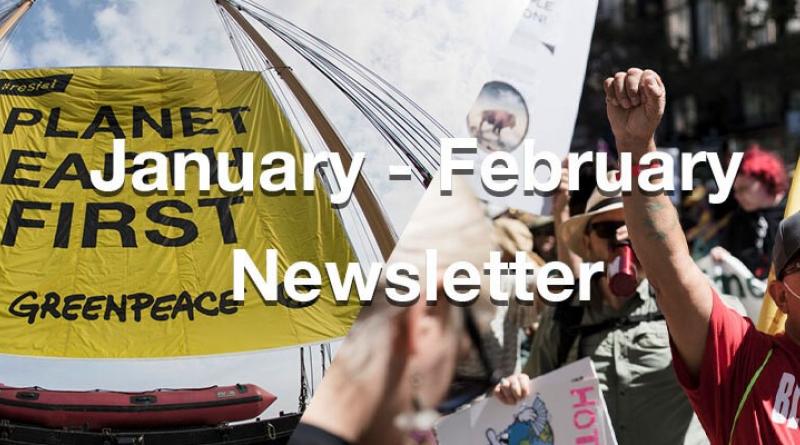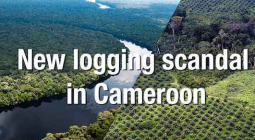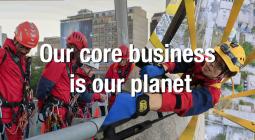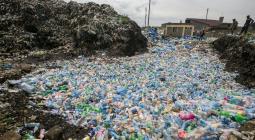Greenpeace Africa: January - February Newsletter | Here we go

2020 was a year of disruption, awakening, and change, with many things forced onto us that were outside of our control. There was no hiding from the COVID-19 pandemic and its impacts, the Black Lives Matter Movement's supercharged momentum, and the looming, growing shadow of the climate crisis. These circumstances made it abundantly clear that the systems that are in place are fundamentally broken. Change is inevitable, and we have to evolve. Hear from our Executive Director, Lagi Toribau, on how Greenpeace Africa plans to move ahead, working with our youth and, most importantly, becoming human again.
Let's jump into the news and updates from January and February of this year.
World Day of Social Justice
CAMPAIGN UPDATES
Climate
It seems recent extreme weather events in Africa were not enough to motivate The President of South Africa and Chair of the African Union to take bold and practical steps for our climate. President Ramaphosa's comments at the World Economic Forum Davos were honestly a copy and paste of 20th-century solutions to 21st-century problems. The President missed an opportunity to rise to the challenges of COVID-19 and the climate crisis, as tens of thousands die due to the global health pandemic. Over 7 000 people have lost their homes in Southern Africa following tropical cyclone Eloise.
Eloise is the third significant cyclone to hit Southern Africa since 2019, causing displacement, destruction of homes, schools, crops and vital infrastructure in Mozambique, Madagascar, Zimbabwe, Botswana and South Africa. Also, the aftermath of public health challenges includes the risk of acquiring waterborne diseases. Extreme weather conditions will become more intense, and communities' consequences are more severe unless the Southern African Development Community takes serious climate action.
Environmental NGOs groundWork and the Vukani Environmental Justice Movement filed a lawsuit against Minister Barbara Creecy. In response, Minister of the Department of Environment, Forestry and Fisheries (DEFF) released an affidavit that stated that she rejected pleas for leniency from Eskom and Sasol executives and would not allow the power utility to operate its plants at current emission levels indefinitely.
The minister is engaging in misinformation by lying to the people of South Africa. In 2019, she granted Sasol its application to continue polluting our country, and DEFF did not communicate this decision to the public until fourteen months later, in January 2021. Greenpeace Africa's engagements with Sasol have made it clear that they will not comply with the already weakened minimum emission standards in any shape or form by 2030. Sasol will continue to apply for postponement in this regard, and Minister Barbra Creecy will concede to their requests in the name of supposed sustainable development.
Meanwhile, air pollution in South Africa has reached dangerously unhealthy levels. Twice in the last week, residents across several communities in Johannesburg and Pretoria were exposed to high Sulphur dioxide (SO2) pollution levels. This exposure was just a taste of what communities in Kriel and Secunda in Mpumalanga experience daily.
Send us a voice note and demand answers from Minister Barbara Creecy.
Oceans
Ever think about the impact that climate change is having on Africa's oceans? In 2011, the United Nations Environment Program identified nineteen climate hotspots in West Africa. These hotspots are located in the central part of the Sahel, Niger, Burkina Faso, northern and coastal Ghana, north of Togo, Benin and Nigeria.
Here's a question for you: why is fossil fuel capital incomparable with social justice? The world we live in was built around an economic system that prioritises never-ending growth over people and the planet's welfare. And fossil fuels are at the core. This system plunders our planet's resources while oppressing our most vulnerable. It is known as "Fossil Capital".
The consequences of global warming are severely impacting two critical activities in West Africa: agricultural activities, which are particularly sensitive to climatic variations, where productivity depends on it, and fishing, the real economic lifeline of the region. Read the blog here.
The devastation of the oil spill in the Indian Ocean from the wrecked MV Wakashio continues. Mauritius is known to most people as a holiday destination because of its gorgeous beaches, volcanic rocks, fragile ecosystems of mangrove forests, coral atolls islets, and underwater coral reefs, seagrass, and historic forts.
What can we learn from the oil leak?
After the oil spill, the company rushed to publish an apology letter, but that did not curb the public outrage that ensued both in Mauritius and in Japan, nor did the apology remove the damage. Greenpeace Japan continues to engage with the company over these demands. Read more here.
Food
Since 2019, Kenya has experienced an unprecedented threat from the desert locust invasion. This invasion is linked to climate change puts millions of Kenyans at risk of food and nutrition insecurity. These voracious pests must be controlled before they cause much damage to crop and pasture.
While some of the control efforts put in place by the Kenyan government are laudable, some are questionable. Measures such as using toxic pesticides that are scientifically proven to harm the environment, humans or non-target organisms such as bees, fish and ants to control locusts raise pertinent questions. Read more here.
Join us in safeguarding our food system
Forest
The science confirms that destroying forests and their biodiversity can be devastating at an individual level and for the planet's climate and communities living in it. Scientists have demonstrated the link between deforestation and the emergence of new animal-borne diseases.
As 2020 has resulted in a stunning mosaic of stories of creativity, resilience, and dignity amid an unprecedented health crisis, the same energy will be invested in 2021 to protect our forests and communities. From Lokolama in DRC to the Baka in Cameroon to avoid possible future pandemic for a better future. Greenpeace Africa's forest campaign is determined to promote participatory mapping and inclusive and participatory land-use planning led by local communities. Join us, and let's protect the Congo Basin rainforest together.
YOUTH
Climate justice
Young people worldwide have been taking the lead in climate crisis issues and demanding climate action for years now and will not be silenced or ignored. Take 17-year-old Raeesah Noor-Mahomed, last year during her matric year. Every Friday, she sat outside the school gate as a protest in a desperate attempt to force South Africa's President and his government to listen. Read her inspiring story here
FOLLOWING CLOSELY
State spying
The news of Advocate Pretorius' reading at the State Capture Enquiry in South Africa about the state spying on NGOs confirms the allegations that surfaced in March 2019 to be true.
When these allegations were initially made, both Greenpeace Africa and Right2Know
attempted to obtain more detailed information about the spying's extent and depth but were stonewalled by the state.
Greenpeace Africa is committed to working towards social and environmental justice, and we condemn attempts to undermine the work that civil society in South Africa does to create a more just future.
That's all for this month's updates.
19 February 2021
Greenpeace Africa




